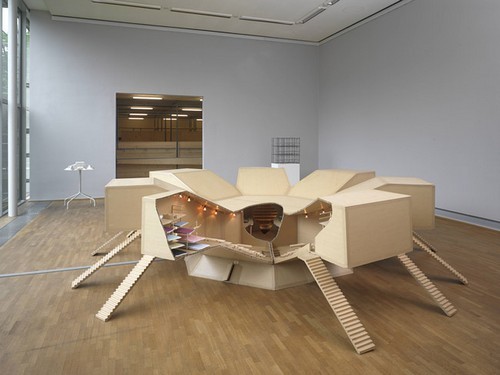Atelier Van Lieshout
22 Sep - 25 Oct 2009
ATELIER VAN LIESHOUT
"Slave City. Cradle to Cradle"
Museum Folkwang im Winzavod, Moskau
September 22 - October 25, 2009
Press conference: Monday, 21 September 2009, 5 pm
Opening: Monday, 21 September 2009, 7 pm
The WINZAVOD Centre for Contemporary Art, and Museum Folkwang will soon be presenting “Slave City. Cradle to Cradle”, an Atelier Van Lieshout exhibition, in Moscow. The show will be part of the guest programme at the Third Moscow Biennale of Contemporary Art (24 Sep – 25 Oct 2009, http://3rd.moscowbiennale.ru)
It moreover represents the continuation of the partnership between Museum Folkwang and the German utility group RWE in the area of contemporary art. One idea underlying this cooperation is to show each of the exhibitions taking place at the Museum Folkwang in Essen in a different country abroad, with a special focus on Eastern Europe.
WINZAVOD (www.winzavod.ru) is one of the most active venues for contemporary art in Russia. It was opened in 2007 on the grounds of a former winery. Atelier Van Lieshout is planning a major exhibition there which will spread out over two floors of the old main building. The White Hall on the first upper level will show a substantial selection of AVL’s Slave City architectural models, while the Red Hall on the ground floor will feature the new large-scale installation Cradle to Cradle.
“Cradle to cradle” is a term used in ecological design. It designates a self-contained materials cycle in which the respective materials are recycled in their entirety. Atelier Van Lieshout applies this approach conceptually to the complete recycling of the human being, regardless of any human or ethical boundaries.
In 1995, Joep van Lieshout (b. 1963) founded a workshop where artists, architects, craftsmen and technicians work together. In 2001 he established AVL-Ville, an independent city-state in the Rotterdam harbour. Joep van Lieshout achieved international renown in the 1990s with the manufacture of mobile houses and “containers” based on concepts such as freedom of movement, flexibility of design and the undermining of government regulations.
The exhibition will be accompanied by a catalogue (144 pages) in English and Russian, published in Moscow, with contributions by well-known Russian and German authors. The book on the exhibition in Essen, Atelier van Lieshout: Slave City (300 pages with numerous illustrations, German/English, Dumont Verlag, 2008, 32 EUR) is available at Museum Folkwang.
Curators: Sabine Maria Schmidt (Museum Folkwang) and Anna Zaitseva (Winzavod, Moscow)
Realized with kind support from RWE AG, Essen, the Mondriaan Stichting,
Netherlands and the Royal Netherlands Embassy in Moscow
"Slave City. Cradle to Cradle"
Museum Folkwang im Winzavod, Moskau
September 22 - October 25, 2009
Press conference: Monday, 21 September 2009, 5 pm
Opening: Monday, 21 September 2009, 7 pm
The WINZAVOD Centre for Contemporary Art, and Museum Folkwang will soon be presenting “Slave City. Cradle to Cradle”, an Atelier Van Lieshout exhibition, in Moscow. The show will be part of the guest programme at the Third Moscow Biennale of Contemporary Art (24 Sep – 25 Oct 2009, http://3rd.moscowbiennale.ru)
It moreover represents the continuation of the partnership between Museum Folkwang and the German utility group RWE in the area of contemporary art. One idea underlying this cooperation is to show each of the exhibitions taking place at the Museum Folkwang in Essen in a different country abroad, with a special focus on Eastern Europe.
WINZAVOD (www.winzavod.ru) is one of the most active venues for contemporary art in Russia. It was opened in 2007 on the grounds of a former winery. Atelier Van Lieshout is planning a major exhibition there which will spread out over two floors of the old main building. The White Hall on the first upper level will show a substantial selection of AVL’s Slave City architectural models, while the Red Hall on the ground floor will feature the new large-scale installation Cradle to Cradle.
“Cradle to cradle” is a term used in ecological design. It designates a self-contained materials cycle in which the respective materials are recycled in their entirety. Atelier Van Lieshout applies this approach conceptually to the complete recycling of the human being, regardless of any human or ethical boundaries.
In 1995, Joep van Lieshout (b. 1963) founded a workshop where artists, architects, craftsmen and technicians work together. In 2001 he established AVL-Ville, an independent city-state in the Rotterdam harbour. Joep van Lieshout achieved international renown in the 1990s with the manufacture of mobile houses and “containers” based on concepts such as freedom of movement, flexibility of design and the undermining of government regulations.
The exhibition will be accompanied by a catalogue (144 pages) in English and Russian, published in Moscow, with contributions by well-known Russian and German authors. The book on the exhibition in Essen, Atelier van Lieshout: Slave City (300 pages with numerous illustrations, German/English, Dumont Verlag, 2008, 32 EUR) is available at Museum Folkwang.
Curators: Sabine Maria Schmidt (Museum Folkwang) and Anna Zaitseva (Winzavod, Moscow)
Realized with kind support from RWE AG, Essen, the Mondriaan Stichting,
Netherlands and the Royal Netherlands Embassy in Moscow

